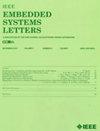基于 FPGA 的 DSP 应用中的高速节能定点有符号乘法器
IF 1.7
4区 计算机科学
Q3 COMPUTER SCIENCE, HARDWARE & ARCHITECTURE
引用次数: 0
摘要
在计算机视觉算法的各种平台中,FPGA作为一种低功耗的解决方案受到了广泛的欢迎。这些算法涉及卷积运算,通常使用有符号乘法器执行卷积运算。因此,这项工作提出了用于数字信号处理(DSP)应用的高速和节能的签名定点乘法器。这项工作的重点是减少组合路径延迟(CPD),使用基于lut的Booth基数-4部分积(PP)生成与Bewick的符号扩展,以及基于dada的并行PP减少与进位保存加法器(CSA),用于Xilinx(现在的AMD) FPGA。提出的设计消除了对PP减少的长携带链的要求。与最先进的(SoA)乘法器相比,所提出的乘法器分别可将CPD降低3%、4%和16%,分别适用于8\ × 8$、16\ × 16$和32\ × 32$尺寸。我们还通过流水线分析了我们提出的$32\ × 32$乘法器,与组合乘法器相比,该乘法器的CPD和EDP分别降低了12.28%和19.47%,而lut和触发器的成本分别增加了3%和80%。本文章由计算机程序翻译,如有差异,请以英文原文为准。
High-Speed Energy-Efficient Fixed-Point Signed Multipliers for FPGA-Based DSP Applications
Among various platforms for computer vision algorithms, FPGA has gained popularity as a low-power solution. These algorithms involve convolution operation which are extensively performed using signed multipliers. Hence, this work proposes high-speed and energy-efficient signed fixed-point multipliers for digital signal processing (DSP) applications. This work focuses on reducing the combinational path delay (CPD) using LUT-based Booth radix-4 partial product (PP) generation with Bewick’s sign extension and Dadda-based concurrent PP reduction with carry save adder (CSA) for Xilinx (now AMD) FPGA. The proposed design eliminates the requirement of a long carry chain for PP reduction. The proposed multiplier reduces CPD by 3%, 4%, and 16% compared to the state-of-the-art (SoA) multiplier for
$8\times 8$
,
$16\times 16$
, and
$32\times 32$
sizes, respectively. We have also analyzed our proposed
$32\times 32$
multiplier by pipelining, which offers CPD and EDP reduction by 12.28% and 19.47% at the cost of a 3% and 80% increase in LUTs and flip-flops, respectively, compared to the combinatorial multiplier.
求助全文
通过发布文献求助,成功后即可免费获取论文全文。
去求助
来源期刊

IEEE Embedded Systems Letters
Engineering-Control and Systems Engineering
CiteScore
3.30
自引率
0.00%
发文量
65
期刊介绍:
The IEEE Embedded Systems Letters (ESL), provides a forum for rapid dissemination of latest technical advances in embedded systems and related areas in embedded software. The emphasis is on models, methods, and tools that ensure secure, correct, efficient and robust design of embedded systems and their applications.
 求助内容:
求助内容: 应助结果提醒方式:
应助结果提醒方式:


